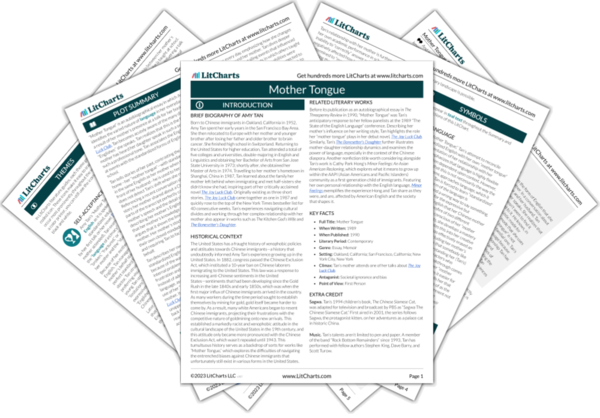Amy Tan’s “Mother Tongue” showcases Tan’s English as it is spoken at home in contrast with its standardized, educational form at school. Inspired by her first talk on her novel The Joy Luck Club (a talk that her mother attended), Tan examines moments of tension between the “language of intimacy”—what some would describe as “broken,” “fractured,” or “limited” English—that she uses with her mother and the “standard English” she learned in school.
Because of her mother’s limited ability to speak standard English, Tan manages phone calls and communication on her mother’s behalf starting in adolescence. Even as she speaks perfect standard English to her mother’s stockbroker and doctor, Tan struggles with standard English herself at school, preferring visual meanings to logical semantics. And even as young Tan struggled with shame about her mother’s “limitations” with English, she also recognizes the vivid expressiveness of their “family talk.” These contrasting “Englishes” complicate Tan’s ability to accept herself as both Chinese and American, not one or the other.
Later, when working on the draft of the Joy Luck Club, she finds that crafting “witty” sentences to prove her “mastery over the English language” creates incomprehensible prose. Tan realizes that she herself cannot fully understand the English she speaks and writes and begins a process of navigating her way back to the English of her mother, seeking to “preserve [its] essence, but neither an English nor a Chinese structure.” Tan’s lifelong struggle to combine her “mother tongue” with “standard” English illustrates her struggle to reconcile and accept both her Chinese and American identities. Tracing the evolution of her relationship between her “mother tongue” and “standard English,” Tan’s journey to self-acceptance culminates in her creation of The Joy Luck Club. Successfully combining both languages within the novel illustrates that the acceptance of one’s true identity requires a process of amalgamation—a process that involves finding points of convergence between multiple different identities, which can ultimately be combined to make something new and unique.
Self-Acceptance ThemeTracker

Self-Acceptance Quotes in Mother Tongue
And it was perhaps the first time she had heard me give a lengthy speech, using the kind of English I have never used with her […] —a speech filled with carefully wrought grammatical phrases, burdened, it suddenly seemed to me, with nominalized forms, past perfect tenses, conditional phrases, forms of standard English that I had learned in school and through books, the forms of English I did not use at home with my mother.

Unlock explanations and citation info for this and every other Mother Tongue quote.
Plus so much more...
Get LitCharts A+It has become our language of intimacy, a different sort of English that relates to family talk, the language I grew up with.
But to me, my mother’s English is perfectly clear, perfectly natural. It’s my mother tongue. Her language, as I hear it, is vivid, direct, full of observation and imagery. That was the language that helped shape the way I saw things, expressed things, made sense of the world.
It has always bothered me that I can think of no way to describe it other than “broken,” as if it were damaged and needed to be fixed, as if it lacked a certain wholeness and soundness. I’ve heard other terms used […] But they seem just as bad, as if everything is limited, including people’s perceptions of the limited-English speaker.
Math is precise; there is only one correct answer. Whereas, for me at least, the answers on English tests were always a judgement call, a matter of opinion and personal experience.
I wrote what I thought to be wittily crafted sentences, sentences that would finally prove I had mastery over the English language.
I began to write stories using all the Englishes I grew up with: the English I spoke to my mother, which for lack of a better term might be described as “simple”; the English she used with me, which for lack of a better term might be described as “broken”; my translation of her Chinese, which could certainly be described as “watered down”; and what I imagined to be her translation of her Chinese if she could speak in perfect English, her internal language, and for that I sought to preserve the essence, but neither an English nor a Chinese structure.
I wanted to capture what language ability tests could never reveal: her intent, her passion, her imagery, the rhythms of her speech and the nature of her thoughts.











